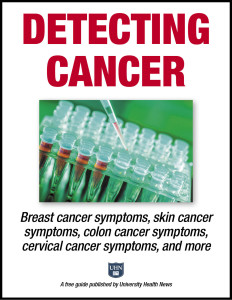HPV-Related Throat Cancer on the Rise Among Men
Smoking, drinking alcohol, and gastroesophageal reflux disease (GERD) all can increase your risk of throat cancer, but genital human papillomavirus (HPV) has become a leading cause of oropharyngeal cancers in the United States. In fact, some 9,000 people are diagnosed each year with throat cancer that may be caused by HPV, according to the Centers for Disease Control and Prevention, and it is about four times more common in men than women.
Symptoms, Screening, and Treatment
Doctors generally categorize throat cancer according to the area of the pharynx—the nasopharynx, the oropharynx, or the hypopharynx—that it affects. The oropharynx is the middle portion of the throat located by the mouth and includes the soft palate, tonsils, and back of the tongue.
The signs and symptoms can also vary, depending on the area affected. Oropharyngeal cancer symptoms can include:
- difficulty swallowing
- trouble opening the mouth
- earaches
- enlarged lymph nodes
- voice changes
- unexplained weight loss
- coughing up blood.
Some people, however, may have no signs or symptoms at all.
Unfortunately, there are no simple screening tests for throat cancer and, in some cases, there are no warning signs until the disease has started to advance. Be sure to speak with your doctor as soon as possible if you begin to develop any related symptoms.
To determine the presence of cancer, your doctor may order a series of tests, including a biopsy, x-ray, computerized tomography (CT) scan, magnetic resonance imaging (MRI), or positron emission tomography (PET) scan of the head and/or neck. Once you have been diagnosed with throat cancer, treatment may include surgery, radiation, and/or chemotherapy.
Detect It Early!
Download this expert FREE guide, Detecting Cancer: Breast cancer symptoms, skin cancer symptoms, colon cancer symptoms, cervical cancer symptoms, and more.
Learn how to recognize cancer warning signs and make the best decisions for care and treatment.
How Does HPV Cause Throat Cancer?
HPV is the most common sexually transmitted disease in the United States, according to the CDC. While it is not harmful to most people and can clear up on its own, it can lead to cervical cancer in women and throat cancer in people infected with oral HPV.
Cancer caused by HPV can take years to develop. It’s unclear whether having HPV alone can cause oropharyngeal cancer, or factors, such as smoking or chewing tobacco, can increase the likelihood that of developing the disease. According to the CDC, about 7 percent of people in the U.S. have oral HPV and 1 percent have the type that is associated with oropharyngeal cancer.
Men are twice as likely as women to develop throat cancer linked to HPV, according to research conducted by the American Association for the Advancement of Science (AAAS). The research also shows that HPV is less likely to clear up on its own in men than in women. There are studies that suggest oral HPV can be passed through open-mouthed kissing and oral sex, but additional research is needed to determine exactly how the infection is passed from one person to another.
The FDA has yet to approve a screening test for oral HPV, nor has it been determined whether HPV vaccines can prevent oropharyngeal cancer, but doctors recommend practicing safe sex, which can reduce your chances of contracting oral HPV.
To reduce the risk of all types of cancers, the American Cancer Society suggests that people quit or refrain from smoking, reduce heavy alcohol use, and eat a healthy and well-balanced diet.
Originally published in May 2016 and updated.
The post HPV-Related Throat Cancer on the Rise Among Men appeared first on University Health News.
Read Original Article: HPV-Related Throat Cancer on the Rise Among Men »
Powered by WPeMatico


